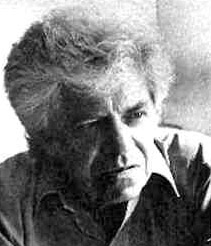Amir Gilboa
אמיר גלבוע

Amir Gilboa (1917-1984) was born in the Ukraine. He studied at a Hebrew school and immigrated to Palestine illegally in 1937. He worked intermittently in kibbutzim, stone quarries and British Army camps. He eventually joined the British Army’s Jewish Brigade and served in Egypt, North Africa and Italy. Towards the end of World War II Gilboa arrived with the Jewish Brigade in the Netherlands and Belgium and participated in the illegal transfer of Jews to Italian ports from where they were taken to Palestine. He also fought in Israel’s War of Independence, and his military experience figures strongly in his early poems. Later on, he became an editor at Massada Publishing House. Gilboa received numerous prizes for his work, including the Shlonsky Prize (1961), the Ussishkin Prize (1964), the Prime Minister’s Prize (1969), the Brenner Prize (1970), the Bialik Prize (1971), the Chomsky Prize (1977), the Fichman Prize (1980), the Israel Prize (1982) and the Neuman Prize (1984). He translated Vinogradoff and Amado, as well as others, into Hebrew.
Consistently one of the most original and experimental of Hebrew poets, Gilboa’s work combines the traditional with the current, and the personal with the national, in what was a conscious break with poetic trends in force at the beginning of his career. Gilboa rejected the traditional use of biblical figures to make moral or nationalistic statements, preferring to identify with them personally, drawing direct parallels between present and past. Occasionally playful, sometimes nightmarish, Gilboa’s poems often take on the perspective of the child, or the poem will have adult and child exchanging roles. Introspection and ambiguity are inherent in Gilboa’s poetry. His unconventional approach set the stage for those poets who matured during the 50s and especially for younger writers who emerged in the 60s and 70s.

